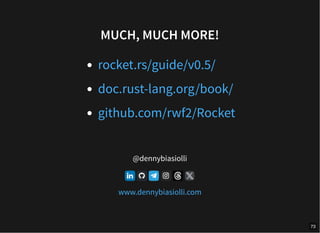The document outlines the journey of a developer learning the Rust programming language and the Rocket web framework. It introduces Rocket as a fast, flexible, and type-safe framework emphasizing security, correctness, and developer experience. The document provides installation instructions, examples of handling requests and responses, managing state, and utilizing various features like forms, JSON input/output, and error handling.
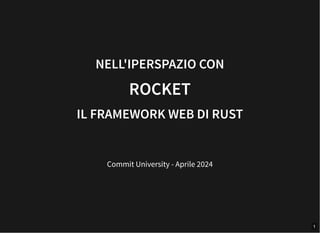

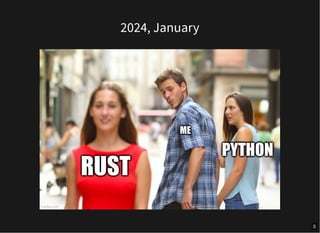
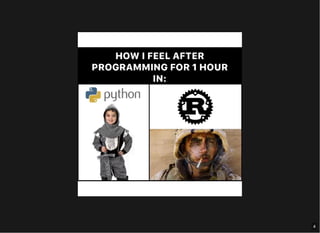
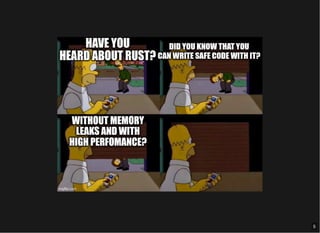
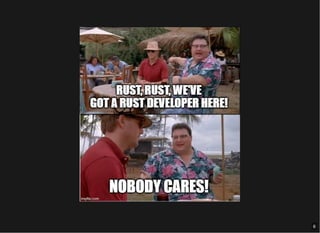
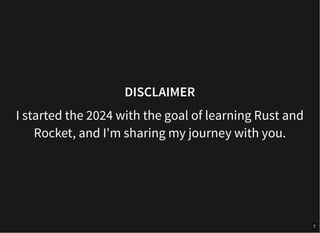
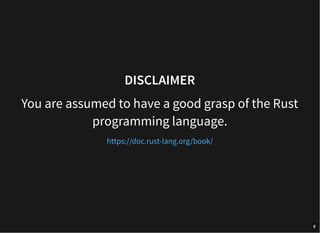
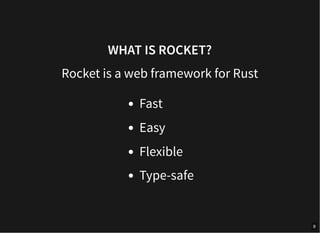
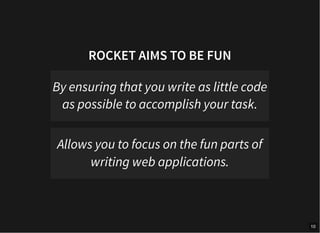
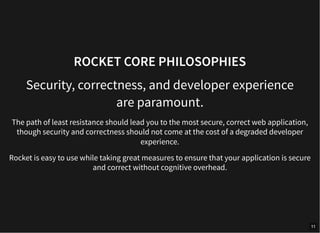
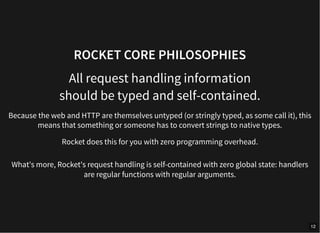
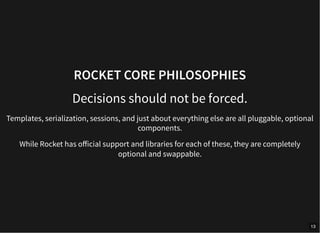
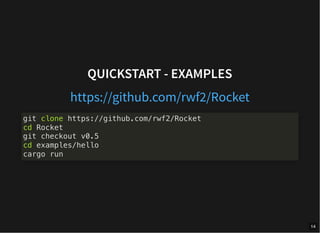
![BASIC INSTALLATION
Cargo.toml
cargo add rocket
[dependencies]
rocket = "0.5.0"
15](https://image.slidesharecdn.com/rocket-ilframeworkwebdirust-240419124056-47e44f17/85/Nell-iperspazio-con-Rocket-il-Framework-Web-di-Rust-15-320.jpg)
![INSTALLATION WITH FEATURES
Cargo.toml
cargo add rocket --features "json,secrets"
[dependencies]
rocket = { version = "0.5.0", features = ["json", "secrets"] }
16](https://image.slidesharecdn.com/rocket-ilframeworkwebdirust-240419124056-47e44f17/85/Nell-iperspazio-con-Rocket-il-Framework-Web-di-Rust-16-320.jpg)
![HELLO, WORLD!
// src/main.rs
#[macro_use] extern crate rocket;
#[get("/")]
fn index() -> &'static str {
"Hello, world!"
}
#[launch]
fn rocket() -> _ {
rocket::build()
.mount("/", routes![index])
}
17](https://image.slidesharecdn.com/rocket-ilframeworkwebdirust-240419124056-47e44f17/85/Nell-iperspazio-con-Rocket-il-Framework-Web-di-Rust-17-320.jpg)
![HELLO, WORLD!
> cargo run
🔧 Configured for debug.
>> address: 127.0.0.1
>> port: 8000
>> workers: [..]
>> keep-alive: 5s
>> limits: [..]
>> tls: disabled
>> temp dir: /tmp
>> log level: normal
>> cli colors: true
🛰 Routes:
>> (index) GET /
🚀 Rocket has launched from http://127.0.0.1:8000
18](https://image.slidesharecdn.com/rocket-ilframeworkwebdirust-240419124056-47e44f17/85/Nell-iperspazio-con-Rocket-il-Framework-Web-di-Rust-18-320.jpg)
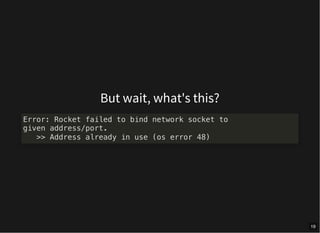
![Rocket.toml FILE
## defaults for all profiles
[default]
port = 8000
## set only when compiled in debug mode,
## i.e, `cargo build` or `cargo run`
[debug]
port = 8001
https://rocket.rs/guide/v0.5/configuration/
20](https://image.slidesharecdn.com/rocket-ilframeworkwebdirust-240419124056-47e44f17/85/Nell-iperspazio-con-Rocket-il-Framework-Web-di-Rust-20-320.jpg)
![Rocket.toml FILE
## set only when the `custom-profile` profile is selected,
## i.e, `ROCKET_PROFILE=custom-profile cargo build --release`
[custom-profile]
port = 9001
## set only when compiled in release mode,
## i.e, `cargo build --release`
[release]
port = 9999
https://rocket.rs/guide/v0.5/configuration/
21](https://image.slidesharecdn.com/rocket-ilframeworkwebdirust-240419124056-47e44f17/85/Nell-iperspazio-con-Rocket-il-Framework-Web-di-Rust-21-320.jpg)
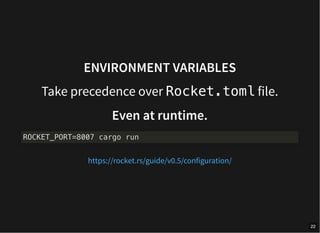
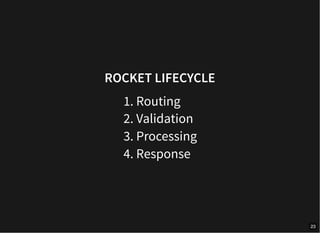
![ROCKET LIFECYCLE
1. Routing
#[get("/bar")] // <-- route attribute
fn bar() -> &'static str {
"This is the /foo/bar route!"
}
#[launch]
fn rocket() -> _ {
rocket::build()
.mount("/foo", routes![bar]) // <-- route mounting
}
24](https://image.slidesharecdn.com/rocket-ilframeworkwebdirust-240419124056-47e44f17/85/Nell-iperspazio-con-Rocket-il-Framework-Web-di-Rust-24-320.jpg)
![ROCKET LIFECYCLE
2. Validation
#[get("/hello/<name>/<age>")]
fn hello(name: &str, age: u8) -> String { // <-- validation
format!("Hello, {} year old named {}!", age, name)
}
25](https://image.slidesharecdn.com/rocket-ilframeworkwebdirust-240419124056-47e44f17/85/Nell-iperspazio-con-Rocket-il-Framework-Web-di-Rust-25-320.jpg)
![ROCKET LIFECYCLE
3. Processing
#[get("/hello/<name>")]
fn hello(name: &str, age: u8) -> String {
/**
* Processing
* i.e, checking the age range, etc.
* This is the main business logic of an application.
* Processing completes by returning a Response.
*/
format!("Hello, {} year old named {}!", age, name)
}
26](https://image.slidesharecdn.com/rocket-ilframeworkwebdirust-240419124056-47e44f17/85/Nell-iperspazio-con-Rocket-il-Framework-Web-di-Rust-26-320.jpg)
![ROCKET LIFECYCLE
4. Response
#[get("/")]
fn index() -> &'static str {
// return "Hello, world!"; // <-- response
"Hello, world!" // <-- response
}
27](https://image.slidesharecdn.com/rocket-ilframeworkwebdirust-240419124056-47e44f17/85/Nell-iperspazio-con-Rocket-il-Framework-Web-di-Rust-27-320.jpg)
![LAUNCHING
Standard format
#[launch]
fn rocket() -> _ {
rocket::build()
.mount("/hello", routes![world])
}
28](https://image.slidesharecdn.com/rocket-ilframeworkwebdirust-240419124056-47e44f17/85/Nell-iperspazio-con-Rocket-il-Framework-Web-di-Rust-28-320.jpg)
![LAUNCHING
allows you to start the server
is useful when a handle to the Future returned by launch() is desired
or when the return value of launch() is to be inspected.
#[rocket::main]
async fn main() -> Result<(), rocket::Error> {
let _rocket = rocket::build()
.mount("/hello", routes![world])
.launch()
.await?;
Ok(())
}
29](https://image.slidesharecdn.com/rocket-ilframeworkwebdirust-240419124056-47e44f17/85/Nell-iperspazio-con-Rocket-il-Framework-Web-di-Rust-29-320.jpg)
![DYNAMIC PATHS
#[get("/hello/<name>")]
fn hello(name: &str) -> String {
format!("Hello, {}!", name)
}
30](https://image.slidesharecdn.com/rocket-ilframeworkwebdirust-240419124056-47e44f17/85/Nell-iperspazio-con-Rocket-il-Framework-Web-di-Rust-30-320.jpg)
![DYNAMIC PATHS
Any type, as long as the type implements the
FromParam trait.
#[get("/hello/<name>/<age>/<cool>")]
fn hello(name: &str, age: u8, cool: bool) -> String {
if cool {
format!("You're a cool {} year old, {}!", age, name)
} else {
format!(
"{}, we need to talk about your coolness.",
name
)
}
}
31](https://image.slidesharecdn.com/rocket-ilframeworkwebdirust-240419124056-47e44f17/85/Nell-iperspazio-con-Rocket-il-Framework-Web-di-Rust-31-320.jpg)
![MULTIPLE SEGMENTS
use std::path::{Path, PathBuf};
use rocket::fs::NamedFile;
#[get("/<file..>")]
async fn files(file: PathBuf) -> Option<NamedFile> {
NamedFile::open(Path::new("static/").join(file))
.await
.ok()
}
32](https://image.slidesharecdn.com/rocket-ilframeworkwebdirust-240419124056-47e44f17/85/Nell-iperspazio-con-Rocket-il-Framework-Web-di-Rust-32-320.jpg)
![SERVE STATIC FILES
The easy way
use rocket::fs::FileServer;
// use rocket::fs::{relative, FileServer};
#[launch]
fn rocket() -> _ {
rocket::build()
// serve files from `/www/static` at path `/public`
.mount("/public", FileServer::from("/www/static"))
// or `relative!("static")` for a local directory
}
33](https://image.slidesharecdn.com/rocket-ilframeworkwebdirust-240419124056-47e44f17/85/Nell-iperspazio-con-Rocket-il-Framework-Web-di-Rust-33-320.jpg)
![HTTP METHODS
get, post, put, delete, head, patch or options
#[get("/your/path")]
34](https://image.slidesharecdn.com/rocket-ilframeworkwebdirust-240419124056-47e44f17/85/Nell-iperspazio-con-Rocket-il-Framework-Web-di-Rust-34-320.jpg)
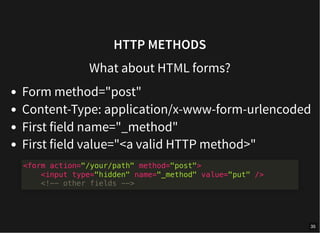
![ASYNC ROUTES
use rocket::tokio::time::{sleep, Duration};
#[get("/delay/<seconds>")]
async fn delay(seconds: u64) -> String {
sleep(Duration::from_secs(seconds)).await;
format!("Waited for {} seconds", seconds)
}
36](https://image.slidesharecdn.com/rocket-ilframeworkwebdirust-240419124056-47e44f17/85/Nell-iperspazio-con-Rocket-il-Framework-Web-di-Rust-36-320.jpg)
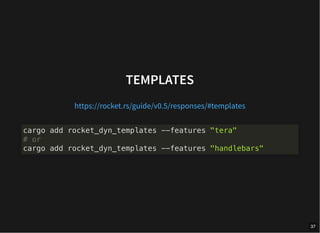
![TEMPLATES
use rocket_dyn_templates::Template;
#[launch]
fn rocket() -> _ {
rocket::build()
.mount("/", routes![/* .. */])
.attach(Template::fairing()) // <- Add this line
}
38](https://image.slidesharecdn.com/rocket-ilframeworkwebdirust-240419124056-47e44f17/85/Nell-iperspazio-con-Rocket-il-Framework-Web-di-Rust-38-320.jpg)
![TEMPLATES
use rocket_dyn_templates::Template;
#[get("/")]
fn index() -> Template {
// let context = /* object-like value */;
// Template::render("index", &context)
// or
Template::render("index", context! {
foo: 123,
})
}
39](https://image.slidesharecdn.com/rocket-ilframeworkwebdirust-240419124056-47e44f17/85/Nell-iperspazio-con-Rocket-il-Framework-Web-di-Rust-39-320.jpg)
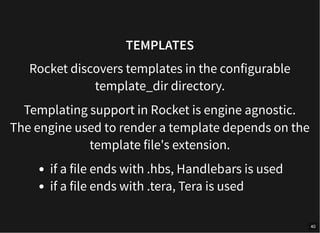
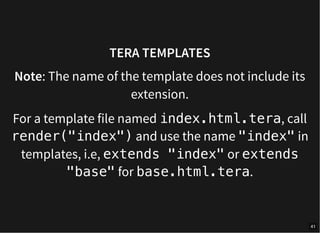
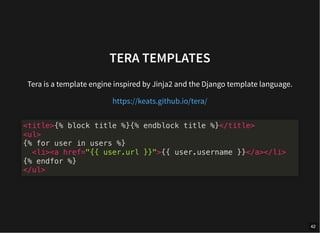
![REQUEST GUARDS
Types that implement the FromRequest trait
Used to extract data from the request
Can be used as arguments in request handlers
Protect a handler from being called erroneously
#[get("/<param>")]
fn index(param: isize, a: A, b: B, c: C) { /* ... */ }
// `A`, `B`, and `C` are request guards
https://api.rocket.rs/v0.5/rocket/request/trait.FromRequest
43](https://image.slidesharecdn.com/rocket-ilframeworkwebdirust-240419124056-47e44f17/85/Nell-iperspazio-con-Rocket-il-Framework-Web-di-Rust-43-320.jpg)
![REQUEST GUARDS
FromRequest trait implementation
use rocket::request::{self, Request, FromRequest};
#[rocket::async_trait]
impl<'r> FromRequest<'r> for MyType {
type Error = MyError;
async fn from_request(req: &'r Request<'_>)
-> request::Outcome<Self, Self::Error> {
/* .. */
}
}
44](https://image.slidesharecdn.com/rocket-ilframeworkwebdirust-240419124056-47e44f17/85/Nell-iperspazio-con-Rocket-il-Framework-Web-di-Rust-44-320.jpg)
![REQUEST GUARD EXAMPLES
struct ApiKey<'r>(&'r str);
#[derive(Debug)]
enum ApiKeyError {
Missing,
Invalid,
}
#[get("/sensitive")]
fn sensitive(key: ApiKey<'_>) -> &'static str {
"Sensitive data."
}
45](https://image.slidesharecdn.com/rocket-ilframeworkwebdirust-240419124056-47e44f17/85/Nell-iperspazio-con-Rocket-il-Framework-Web-di-Rust-45-320.jpg)
![REQUEST GUARD EXAMPLES
#[rocket::async_trait]
impl<'r> FromRequest<'r> for ApiKey<'r> {
type Error = ApiKeyError;
async fn from_request(req: &'r Request<'_>)
-> Outcome<Self, Self::Error> {
/// Returns true if `key` is a valid API key string.
fn is_valid(key: &str) -> bool {
key == "valid_api_key"
}
match req.headers().get_one("x-api-key") {
None => Outcome::Error(
(Status::BadRequest, ApiKeyError::Missing)),
Some(key) if is_valid(key) => Outcome::Success(
ApiKey(key)),
Some(_) => Outcome::Error(
(Status::BadRequest, ApiKeyError::Invalid)),
}
}
}
46](https://image.slidesharecdn.com/rocket-ilframeworkwebdirust-240419124056-47e44f17/85/Nell-iperspazio-con-Rocket-il-Framework-Web-di-Rust-46-320.jpg)
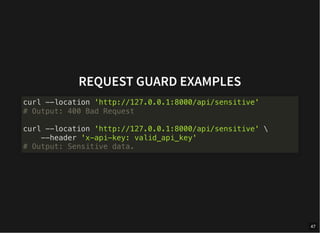
![🍪COOKIES?
use rocket::form::Form;
use rocket::response::Redirect;
use rocket::http::CookieJar;
#[post("/", data = "<message>")]
fn submit(cookies: &CookieJar<'_>, message: Form<&str>) -> Red
cookies.add(("message", message.to_string()));
Redirect::to(uri!(index))
}
#[get("/")]
fn index(cookies: &CookieJar<'_>) -> Option<String> {
cookies.get("message")
.map(|crumb| format!("Message: {}", crumb.value()))
}
48](https://image.slidesharecdn.com/rocket-ilframeworkwebdirust-240419124056-47e44f17/85/Nell-iperspazio-con-Rocket-il-Framework-Web-di-Rust-48-320.jpg)
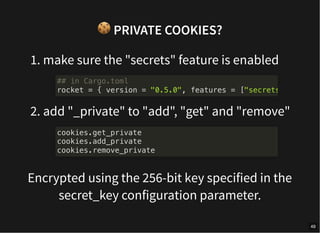
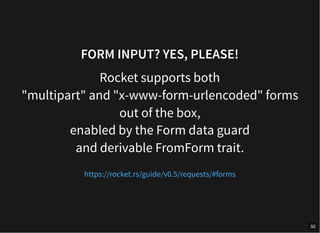
![FORM INPUT
use rocket::form::Form;
#[derive(FromForm)]
struct Task<'r> {
description: &'r str,
complete: bool
}
#[post("/todo", data = "<task>")]
fn new(task: Form<Task<'_>>) { /* .. */ }
51](https://image.slidesharecdn.com/rocket-ilframeworkwebdirust-240419124056-47e44f17/85/Nell-iperspazio-con-Rocket-il-Framework-Web-di-Rust-51-320.jpg)
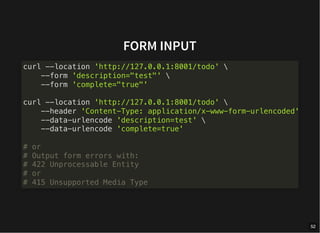
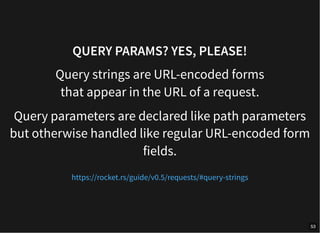
![QUERY PARAMS
or
#[get("/tasks?<filter>")]
fn tasks(filter: &str) { /* .. */ }
use rocket::form::Form;
#[derive(FromForm)]
struct Task<'r> {
description: &'r str,
complete: bool
}
#[get("/tasks?<task>")]
fn tasks(task: Task<'_>) { /* .. */ }
// or
#[get("/tasks?<task..>")]
fn tasks(task: Task<'_>) { /* .. */ }
54](https://image.slidesharecdn.com/rocket-ilframeworkwebdirust-240419124056-47e44f17/85/Nell-iperspazio-con-Rocket-il-Framework-Web-di-Rust-54-320.jpg)
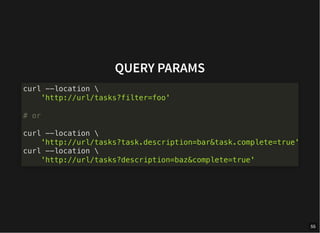
![JSON INPUT? YES, PLEASE!
Make sure the "json" feature is enabled
The Json<T> guard deserializes body data as JSON.
The only condition is that the generic type T
implements the Deserialize trait from serde.
## in Cargo.toml
rocket = { version = "0.5.0", features = ["json"] }
https://rocket.rs/guide/v0.5/requests/#json
56](https://image.slidesharecdn.com/rocket-ilframeworkwebdirust-240419124056-47e44f17/85/Nell-iperspazio-con-Rocket-il-Framework-Web-di-Rust-56-320.jpg)
![JSON INPUT
use rocket::serde::{Deserialize, json::Json};
#[derive(Deserialize)]
#[serde(crate = "rocket::serde")]
struct Task<'r> {
description: &'r str,
complete: bool
}
#[post("/todo", data = "<task>")]
fn new(task: Json<Task<'_>>) { /* .. */ }
57](https://image.slidesharecdn.com/rocket-ilframeworkwebdirust-240419124056-47e44f17/85/Nell-iperspazio-con-Rocket-il-Framework-Web-di-Rust-57-320.jpg)
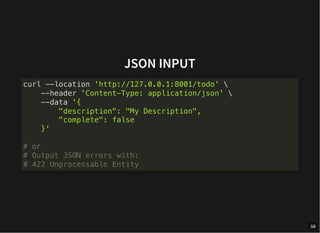
![JSON OUTPUT
use rocket::serde::{Deserialize, Serialize, json::Json};
#[derive(Deserialize, Serialize)]
#[serde(crate = "rocket::serde")]
struct Task<'r> {
description: &'r str,
complete: bool
}
#[post("/todo", data = "<task>")]
fn new(task: Json<Task<'_>>) -> Json<Task<'_>> {
task
}
59](https://image.slidesharecdn.com/rocket-ilframeworkwebdirust-240419124056-47e44f17/85/Nell-iperspazio-con-Rocket-il-Framework-Web-di-Rust-59-320.jpg)
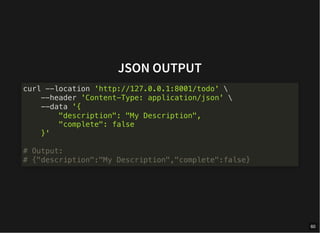
![ERROR CATCHERS
https://rocket.rs/guide/v0.5/requests/#error-catchers
use rocket::Request;
#[catch(404)]
fn not_found() { /* .. */ }
// or
#[catch(404)]
fn not_found(req: &Request) {
format!("Sorry, '{}' is not a valid path.", req.uri())
}
61](https://image.slidesharecdn.com/rocket-ilframeworkwebdirust-240419124056-47e44f17/85/Nell-iperspazio-con-Rocket-il-Framework-Web-di-Rust-61-320.jpg)
![ERROR CATCHERS
fn main() {
rocket::build()
.register("/", catchers![not_found]);
.register("/foo", catchers![foo_not_found]);
}
62](https://image.slidesharecdn.com/rocket-ilframeworkwebdirust-240419124056-47e44f17/85/Nell-iperspazio-con-Rocket-il-Framework-Web-di-Rust-62-320.jpg)
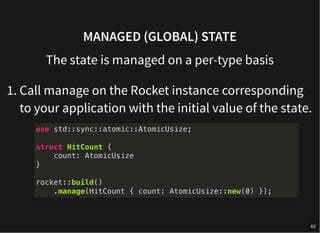
![MANAGED (GLOBAL) STATE
2. Add a &State<T> type to any request handler,
where T is the type of the value passed into manage.
use rocket::State;
#[get("/count")]
fn count(hit_count: &State<HitCount>) -> String {
let current_count = hit_count.count.load(Ordering::Rela
format!("Number of visits: {}", current_count)
}
64](https://image.slidesharecdn.com/rocket-ilframeworkwebdirust-240419124056-47e44f17/85/Nell-iperspazio-con-Rocket-il-Framework-Web-di-Rust-64-320.jpg)
![REQUEST-LOCAL STATE
use rocket::request::{self, Request, FromRequest};
/// A global atomic counter for generating IDs.
static ID_COUNTER: AtomicUsize = AtomicUsize::new(0);
/// A type that represents a request's ID.
struct RequestId(pub usize);
#[get("/")]
fn id(id: &RequestId) -> String {
format!("This is request #{}.", id.0)
}
65](https://image.slidesharecdn.com/rocket-ilframeworkwebdirust-240419124056-47e44f17/85/Nell-iperspazio-con-Rocket-il-Framework-Web-di-Rust-65-320.jpg)
![REQUEST-LOCAL STATE
/// Returns the current request's ID,
/// assigning one only as necessary.
#[rocket::async_trait]
impl<'r> FromRequest<'r> for &'r RequestId {
type Error = ();
async fn from_request(request: &'r Request<'_>)
-> request::Outcome<Self, Self::Error> {
// The closure passed to `local_cache`
// will be executed at most once per request:
// When requested again, will return the same value.
request::Outcome::Success(request.local_cache(|| {
RequestId(ID_COUNTER.fetch_add(1, Ordering::Relaxe
}))
}
66](https://image.slidesharecdn.com/rocket-ilframeworkwebdirust-240419124056-47e44f17/85/Nell-iperspazio-con-Rocket-il-Framework-Web-di-Rust-66-320.jpg)
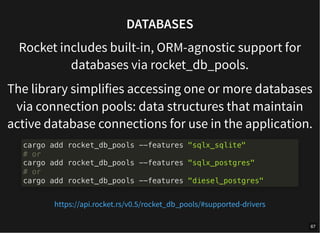
![DATABASES
Configure at least a URL for the database under
databases.$name (in Rocket.toml), where $name is
your choice of database name:
[default.databases.custom_name]
url = "database.sqlite"
[default.databases.custom_name_postgres]
url = "postgresql://[user[:password]@][host][:port][/dbname]"
68](https://image.slidesharecdn.com/rocket-ilframeworkwebdirust-240419124056-47e44f17/85/Nell-iperspazio-con-Rocket-il-Framework-Web-di-Rust-68-320.jpg)
![DATABASES
#[macro_use] extern crate rocket;
use rocket_db_pools::{Database, Connection};
use rocket_db_pools::sqlx::{self, Row};
#[derive(Database)]
#[database("custom_name")]
struct Logs(sqlx::SqlitePool); // or sqlx::PgPool
#[launch]
fn rocket() -> _ {
rocket::build()
.attach(Logs::init())
.mount("/", routes![read])
}
69](https://image.slidesharecdn.com/rocket-ilframeworkwebdirust-240419124056-47e44f17/85/Nell-iperspazio-con-Rocket-il-Framework-Web-di-Rust-69-320.jpg)
![DATABASES
#[get("/<id>")]
async fn read(mut db: Connection<Logs>, id: i64)
-> Option<String> {
sqlx::query("SELECT content FROM logs WHERE id = ?")
.bind(id)
.fetch_one(&mut **db).await
.and_then(|r| Ok(r.try_get(0)?))
.ok()
}
70](https://image.slidesharecdn.com/rocket-ilframeworkwebdirust-240419124056-47e44f17/85/Nell-iperspazio-con-Rocket-il-Framework-Web-di-Rust-70-320.jpg)
![DATABASES
use rocket::serde::{Serialize, Deserialize, json::Json};
use rocket_db_pools::{Database, Connection};
use rocket_db_pools::diesel::{PgPool, prelude::*};
#[derive(Database)]
#[database("custom_name_postgres")]
struct Db(PgPool);
#[derive(Debug, Clone, Deserialize, Serialize, Queryable, Inse
#[serde(crate = "rocket::serde")]
#[diesel(table_name = posts)]
struct Post {
#[serde(skip_deserializing)]
id: Option<i64>,
title: String,
text: String,
#[serde(skip_deserializing)]
published: bool,
}
71](https://image.slidesharecdn.com/rocket-ilframeworkwebdirust-240419124056-47e44f17/85/Nell-iperspazio-con-Rocket-il-Framework-Web-di-Rust-71-320.jpg)
![DATABASES
table! {
posts (id) {
id -> Nullable<BigInt>,
title -> Text,
text -> Text,
published -> Bool,
}
}
#[get("/<id>")]
async fn read(mut db: Connection<Db>, id: i64) -> Option<Json<
posts::table
.filter(posts::id.eq(id))
.first(&mut db)
.await
.map(Json)
.ok()
}
72](https://image.slidesharecdn.com/rocket-ilframeworkwebdirust-240419124056-47e44f17/85/Nell-iperspazio-con-Rocket-il-Framework-Web-di-Rust-72-320.jpg)
